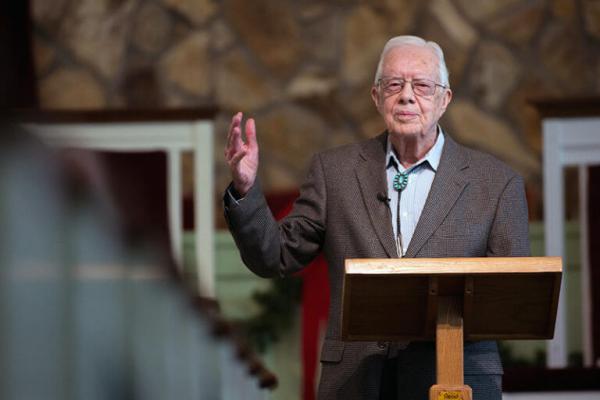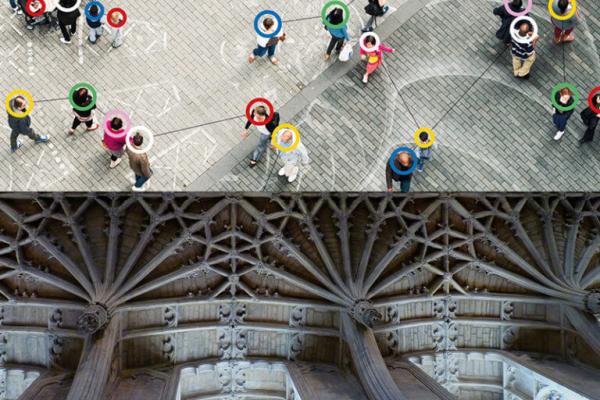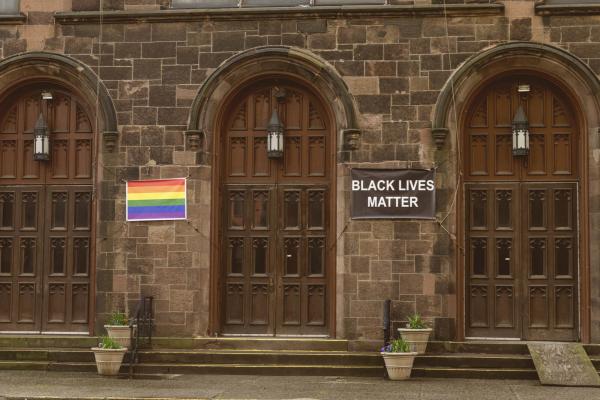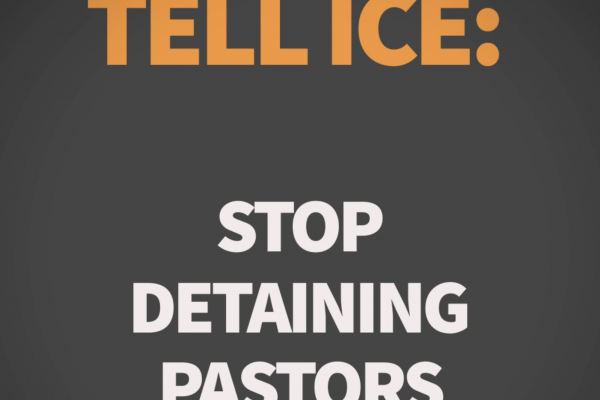Just like poverty stunted the lives of the people of Jesus’ day, poverty hampers, circumscribes the lives of millions of God’s children in our day. 1 in 2 people living in the United States are poor or low-income; 43 percent of US children live in families that struggle to feed, clothe, and house them. There are 28 million people without health care, 65 million workers who get paid too little to sustain themselves and their families, and a record 14 million (1 in 9) U.S. homes are vacant. 3.5 million people experience homelessness each year and 39 percent of them are children.
At 9:50 a.m., Rosalynn Carter, who turns 90 in August, takes a seat in the fifth row along the wall to my right.
A few minutes later, Jimmy walks in, his weathered face smiling, microphone in hand.
Today, he says, we’ll be reviewing “one of the most difficult sections of the Bible.”
“It’s hard to really put into words,” said Marita Rother, a nun and younger sister of the priest who was shot to death on July 28, 1981, while serving as a Catholic missionary during Guatemala’s bloody civil war.
“I think the whole thing is beyond what any of us would expect to be happening,” she added.
“We’ve added definition to the picture of evolution that has deepened and enriched our understanding of biological processes,” Donovan Schaefer, an Oxford lecturer in science and religion who co-organized the conference, told the opening session of the July 19-22 meeting.
But he added: “It would be naive to imagine that the grander questions about biology, religion, the humanities, and evolutionary theory generally have been put to death.”
Last week, President Donald Trump announced via Twitter his intent to bar transgender from people serving in the military — a move reportedly heavily influenced by the Family Research Council, a conservative evangelical lobbying organization. The Public Religion Research Institute reports that more than one in five Americans have a close friend or family member who is transgender and more than six in ten Americans say transgender people face a lot of discrimination in the country today. This snapshot captures the dynamics of the Trump era: the anxieties and reactionary measures of religious conservatives within a cultural and religious landscape that is dramatically shifting.
Reauthorizing current surveillance laws would invade the privacy of American citizens, libertarian Sen. Rand Paul and liberal Sen. Ron Wyden warned Thursday.
The Foreign Intelligence Surveillance Act of 1978 Amendments Act of 2008 is set to lapse at the end of this year. Section 702 of the law allows, “The Intelligence Community to target communications of non-U.S. persons located outside the United States for foreign intelligence purposes,” according to the House Intelligence Committee.
1. Why Alaska's Lisa Murkowski Isn’t Afraid of Donald Trump
She won her seat as an independent write-in. She enjoys wide support from Alaskan Democrats, centrist Republicans, and Alaska Natives. Meet Lisa Murkowski, one of the Republican Senators who has staunchly opposed the GOP health care bill.
2. I Don’t Want to Watch Slavery Fan Fiction
The producers of HBO’s massively popular “Game of Thrones” are following up their fantasy hit with a rewriting of history: “Confederate,” a show that envisions what America would be like had the South won the war. The project idea has sparked significant backlash — here, Roxane Gay digs into why.
Sharif's two previous stints in power were also cut short, including by a military coup in 1999, but he came back from exile to win a resounding victory in the 2013 general elections.
His ruling PML-N party, which has a majority in the parliament, is now expected to appoint a new prime minister.
Collins and Murkowski both voted against more comprehensive Republican proposals to repeal and replace Obamacare this week. Trump has singled out Murkowski for criticism, saying on Twitter that she had let down the Republican Party and the country.








